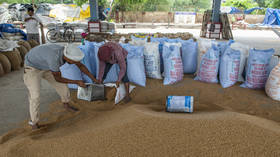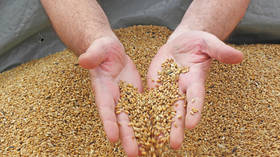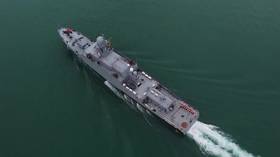Food crisis not linked to sanctions – US
Washington claims its restrictions on Russia don’t affect the global food market

Despite sounding the alarm about rising global food prices, the US has no intention of lifting restrictions on Russian trade, US State Department spokesman Ned Price told journalists during a daily briefing on Wednesday.
Moscow says they affect its ability to export food and fertilizer, but that is a “lie,” he said
“We certainly won’t lift our sanctions in response to empty promises, and we’ve heard empty promises before from the Russian Federation,” Price said when asked if Washington would waiver the restrictions as Moscow suggested.
The US accused Russia of causing a surge in food prices by continuing its military action in Ukraine. Western nations called on Russia to facilitate the export of grain from Ukraine, but Moscow said the situation was complex and not as one-sided as Western nations claim it to be.
One of the latest comments on the issue came from Russian Deputy Foreign Minister Andrey Rudenko on Wednesday. He said alleviating the food crisis would require “lifting sanctions imposed on Russian exports and financial transactions” as well as “removing sea mines from all Ukrainian ports”.
Price dismissed this statement and others made by Russian officials as a series of “lies” and “disinformation”.
“US sanctions are not causing disruptions to Russia’s agricultural exports. The fact is that US sanctions were specifically designed to allow for the export of agricultural commodities and fertilizer from Russia,” he said.
Washington reportedly did consider at one point imposing sanctions against Russian food and fertilizer, even as buyers of Russian products like Brazil strongly objected. US Secretary of Agriculture Tom Vilsack said that “maybe sacrifices are necessary to address the unjustified war that Russia has chosen to start,” during a UN meeting on food security in March. Ultimately Washington decided against such a move and added food products and fertilizer to a list of exemptions.
The state department spokesman implied that Russian officials, including Rudenko, falsely claim otherwise. Meanwhile Moscow says that its food and fertilizer exports are hurt indirectly by the restrictions on financial transactions, insurance of vessels, use of Western port facilities by Russian ships and similar factors.
Likewise, it was Ukraine’s decision to deploy mines along its coast to prevent possible Russian amphibious attacks and to ban foreign ships from leaving its ports, Moscow stated. It said its military won’t stop civilian traffic to Ukrainian ports, provided the ships go along Russia-designated and controlled routes. But Russia alone cannot ensure their safety, it said. Western officials accuse Moscow of maintaining a full naval blockade of Ukraine.
Price and other Western officials, like British Defence Secretary Ben Wallace, interpreted Rudenko’s remarks as an offer of free passage to ships carrying Ukrainian grain in exchange for sanctions relief.
Russia launched an offensive against Ukraine in late February, following Kiev’s failure to implement the terms of the Minsk agreements, first signed in 2014, and Moscow’s eventual recognition of the Donbass republics of Donetsk and Lugansk. The German- and French-brokered protocols were designed to give the breakaway regions special status within the Ukrainian state.
The Kremlin has since demanded that Ukraine officially declare itself a neutral country that will never join the US-led NATO military bloc. Kiev insists the Russian offensive was completely unprovoked and has denied claims it was planning to retake the two republics by force.
https://www.rt.com/news/556113-russia-sanctions-grain-ukraine/



0 Comments:
Post a Comment
Subscribe to Post Comments [Atom]
<< Home